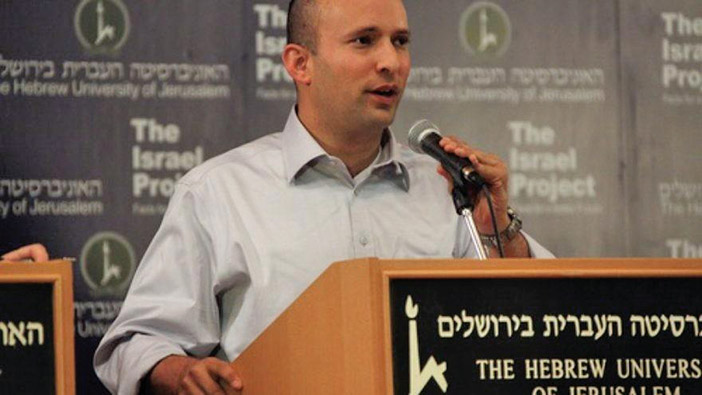
Israel’s effort to curtail Iran’s nuclear and regional ambitions is an existential one, Habayit Hayehudi leader Education Minister Naftali Bennett said this week. Speaking at the annual Herzliya Conference on global security, Bennett also commented on the threat from Lebanon, saying Israel did not deal with it adequately in the past. He said that although many believed Israel’s policy toward Hezbollah would change following the Second Lebanon War in 2006, this was not the case.
He said that under former Prime Minister Ehud Olmert and current Prime Minister Benjamin Netanyahu “we saw the military positions that were established [in Lebanon] and the violations and we turned a blind eye. Hezbollah later underwent another metamorphosis, and it [now] has 130,000 rockets. Today, Hezbollah constitutes a strategic but not existential threat.”
However, he said that policy has changed in the past week following the significant gains by Hezbollah and its political allies in Lebanon’s parliamentary elections. Hezbollah and Lebanon are one and the same, he said.
“Hezbollah is the strongest organization in Lebanon. We saw that in the last elections. An attack by Hezbollah on Israel will lead to Lebanon’s destruction. One cannot hunt rockets without damaging the surroundings. The whole concept of chasing after a needle in a haystack is wrong. You can’t catch water. You can do it when you freeze the water,” he said.
“The address is not Hezbollah, but Lebanon. At the beginning of the Second Lebanon War, [then-U.S. Secretary of State] Condoleezza Rice told Olmert, ‘Hit Hezbollah as much as you want, but don’t hit Lebanon.’ That was when the fate of the war was sealed and that is why we got the results that we got.”
He told the audience to “put yourselves in [Hezbollah leader Hassan] Nasrallah’s shoes. He has two identities, Lebanese and Shiite Iranian. Up until now, he could have hit Israel without Israel hitting Lebanon.”
But now, “those who depict themselves as the defenders of Lebanon will bring the country’s destruction if it attacks Israel and plays the ‘Iranian game.’ The people of Lebanon are not interested in fighting,” Bennett said.
On the threat posed by Iran, Bennett said Israel was once “of the wrong, decentralized mindset. Hamas and Hezbollah would hit us, and we wouldn’t attribute it to Iran, even though it fights Israel through proxies.
“Today, we have adopted the ‘head of the octopus’ doctrine. We will not draw blood in Shujaiyya [in the Gaza Strip] and Maroun al-Ras [in Lebanon] when the head of the octopus rests comfortably [in Tehran]. We changed our mindset in 2013. We started to act against the flow of weapons from Iran, for example, and we upped the intensity. We are now acting against the octopus itself: Iranian soldiers in Syria.”
Nevertheless, Bennett said, “This is still not an action against the ‘head of the octopus.’ I can tell you with full confidence, Israel is stronger than Iran and more determined than Iran. Because for Iran, the battle against us in Syria is a distant adventure; for us it is life. Imagine if we would send soldiers to Afghanistan—how accepting would the public be of that? In the test of determination and consistency, the State of Israel will win. If the Iranians continue with their moves, they will find that Syria is their Vietnam.”
As for a possible Israeli attack on the Shiite country, Bennett said, “I am not for attacking Iran now, but that is the next phase. That is how we will deter them. In light of the political and socio-economic situation in Iran, I believe the ayatollahs’ regime is on borrowed time and is destined to collapse. It is directing its national resources, including human capital and financial, to adventures. The Iranian people seek peace.
“As education minister, I say the Israeli nation respects the Persian nation. We have no interest in adventures outside of Israel. Nevertheless, I turn to the young Iranians [and say]: ‘Your regime has set out on an adventure to destroy the Jewish state. If there is a need to do so, we will fight back, and we will win. Our people are determined to protect ourselves at any price. It is on you, the young generation in Iran, to urge the regime to end its adventures.’”
Speaking later at a national conference of student and youth councils, Bennett said he would summarize IDF policy as: “If someone comes to kill you, rise up and kill him first.”
Bennett said, “We are in a tense period, facing enemies from the north and the east, near and far. … We will not bury our heads in the sand. We will not allow the enemy to acquire the ability to attack us. We are stronger than Iran and more determined than Iran. For Iran, the war on our border is an adventure; for us it is a matter of life and death, and that is why we will win.”
By Shlomo Cesana, Noam Dvir and Israel Hayom Staff/JNS.org










